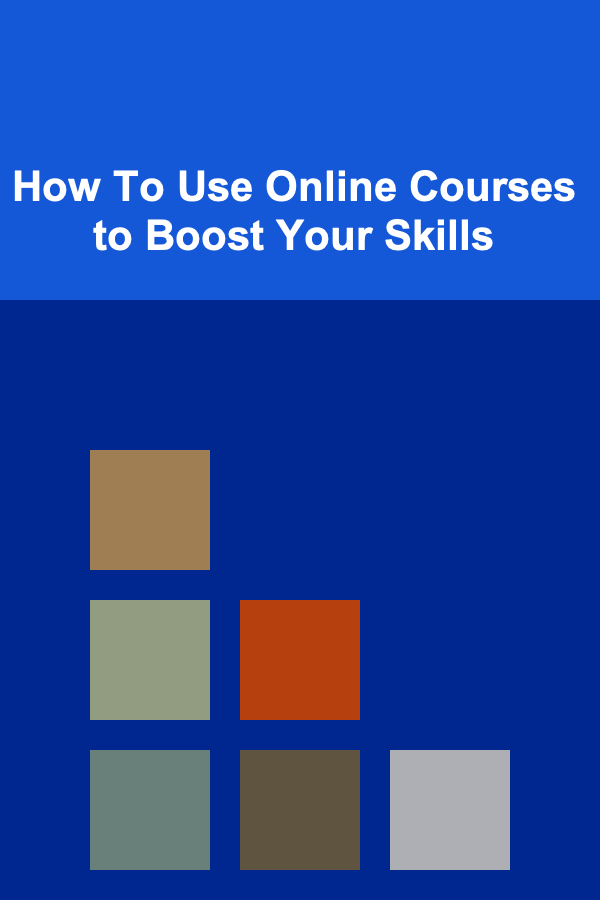
How To Use Online Courses to Boost Your Skills
ebook include PDF & Audio bundle (Micro Guide)
$12.99$7.99
Limited Time Offer! Order within the next:

In today's rapidly evolving world, continuous learning is no longer optional; it's a necessity. The skills that are relevant today might be obsolete tomorrow, making it crucial to constantly adapt and acquire new knowledge. Thankfully, the internet has democratized education, providing access to a vast array of online courses that can help you boost your skills, advance your career, and pursue your passions. This article delves into the strategies, considerations, and practical tips for effectively utilizing online courses to achieve your learning goals.
Understanding the Landscape of Online Learning
Before diving into specific courses and platforms, it's essential to understand the diverse landscape of online learning. Online courses come in various formats, cater to different learning styles, and cover a wide range of subjects. Recognizing these nuances will allow you to make informed decisions and choose the courses that best align with your individual needs and objectives.
Types of Online Courses
- MOOCs (Massive Open Online Courses): These are typically free or low-cost courses offered by universities and institutions worldwide. Platforms like Coursera, edX, and Udacity are prominent providers of MOOCs. They often feature video lectures, quizzes, assignments, and discussion forums.
- Specialized Courses and Certificates: Many platforms offer specialized courses or certificate programs that focus on specific skills or areas of expertise. These programs often involve a series of related courses and may require a final project or exam.
- Bootcamps: Bootcamps are intensive, short-term programs designed to provide learners with the practical skills needed to enter a specific field, such as web development or data science. They typically involve a significant time commitment and may be more expensive than other types of online courses.
- Subscription-Based Platforms: Platforms like Skillshare, LinkedIn Learning, and Pluralsight offer access to a vast library of courses for a monthly or annual subscription fee. These platforms are often a good option for individuals who want to explore a wide range of topics or who prefer a flexible learning schedule.
- University-Level Online Degrees: Many universities now offer fully online degree programs, allowing students to earn a bachelor's, master's, or doctoral degree from anywhere in the world.
Learning Styles and Course Formats
Different individuals learn in different ways. Some prefer visual learning through videos, while others prefer reading text or engaging in hands-on activities. Understanding your own learning style can help you choose courses that are designed to effectively engage you.
- Video-Based Courses: These courses primarily rely on video lectures and demonstrations. They are well-suited for visual learners and those who appreciate a dynamic learning experience.
- Text-Based Courses: These courses rely on written materials, such as articles, essays, and research papers. They are well-suited for individuals who prefer to learn by reading and who appreciate a more in-depth exploration of the subject matter.
- Interactive Courses: These courses incorporate interactive elements, such as quizzes, simulations, and coding exercises. They are well-suited for individuals who learn best by doing and who appreciate a more engaging learning experience.
- Project-Based Courses: These courses require learners to complete a real-world project or assignment that demonstrates their understanding of the material. They are well-suited for individuals who want to apply their newly acquired skills in a practical setting.
Setting Clear Learning Goals
Before you enroll in any online course, it's crucial to define your learning goals. What skills do you want to acquire? What knowledge do you want to gain? What are you hoping to achieve by taking the course? Having clear and specific goals will help you stay focused, motivated, and on track.
Identifying Your Skill Gaps
Start by identifying the skill gaps that are holding you back from achieving your professional or personal goals. What skills are required for the job you want? What knowledge do you need to pursue your passion? Conducting a thorough self-assessment can help you pinpoint the areas where you need to improve.
Defining Specific, Measurable, Achievable, Relevant, and Time-Bound (SMART) Goals
Once you've identified your skill gaps, it's important to define SMART goals. This framework ensures that your goals are well-defined and actionable.
- Specific: Clearly define what you want to achieve. For example, instead of saying "I want to learn about data science," say "I want to learn the fundamentals of data science, including data analysis, machine learning, and data visualization."
- Measurable: Define how you will measure your progress. For example, "I will complete three data science courses on Coursera and achieve a score of at least 80% on each quiz and assignment."
- Achievable: Set goals that are challenging but realistic. Don't set yourself up for failure by aiming too high.
- Relevant: Ensure that your goals are aligned with your overall objectives. The skills you acquire should be relevant to your career aspirations or personal interests.
- Time-Bound: Set a deadline for achieving your goals. This will help you stay motivated and on track. For example, "I will complete these three data science courses within six months."
Aligning Courses with Your Career Goals
If your primary goal is career advancement, choose courses that are directly relevant to your desired job or industry. Research the skills and qualifications that employers are looking for and select courses that will help you acquire those skills. Consider networking with professionals in your field to gain insights into the most valuable skills and certifications.
Choosing the Right Online Courses and Platforms
With so many online courses and platforms available, it can be overwhelming to choose the right ones. Here are some factors to consider:
Reputation and Credibility of the Provider
Choose courses offered by reputable universities, institutions, or industry experts. Look for providers that have a proven track record of delivering high-quality education. Check reviews and ratings from previous students to get an idea of the course's quality and effectiveness.
Course Content and Curriculum
Carefully review the course content and curriculum to ensure that it covers the topics you're interested in learning. Look for courses that are well-structured, comprehensive, and up-to-date.
Instructor Expertise and Experience
Research the instructor's background and experience. Are they experts in their field? Do they have a proven track record of teaching and mentoring students? Look for instructors who are passionate about their subject and who are able to communicate complex concepts in a clear and engaging way.
Cost and Time Commitment
Consider the cost of the course and the amount of time required to complete it. Can you afford the course fees? Do you have enough time in your schedule to dedicate to the course? Be realistic about your budget and time constraints.
Learning Style and Course Format
Choose courses that align with your learning style. If you prefer visual learning, look for video-based courses. If you prefer reading, look for text-based courses. If you prefer hands-on learning, look for interactive or project-based courses.
Community and Support
Look for courses that offer a strong sense of community and support. Are there discussion forums where you can interact with other students? Is there a dedicated support team that can answer your questions and provide assistance? A supportive learning environment can significantly enhance your learning experience.
Accreditation and Certification
If you're taking a course for career advancement, consider whether it's accredited or offers a recognized certification. Accreditation can add credibility to your qualifications and make you more attractive to employers.
Effective Strategies for Online Learning
Enrolling in an online course is just the first step. To maximize your learning potential, you need to adopt effective learning strategies.
Creating a Dedicated Learning Environment
Designate a quiet and comfortable space in your home or office where you can focus on your studies without distractions. Make sure you have a reliable internet connection, a comfortable chair, and all the necessary materials.
Time Management and Scheduling
Create a study schedule and stick to it as much as possible. Break down your learning goals into smaller, manageable tasks and allocate specific time slots for each task. Use a planner or calendar to keep track of your deadlines and commitments.
Active Learning Techniques
Don't just passively watch videos or read text. Engage actively with the material by taking notes, asking questions, and participating in discussions. Summarize key concepts in your own words and try to apply them to real-world scenarios.
Note-Taking and Summarization
Develop effective note-taking strategies to capture the key concepts and ideas presented in the course. Use different colors, symbols, and abbreviations to organize your notes. Regularly summarize your notes to reinforce your understanding of the material.
Utilizing Online Forums and Communities
Take advantage of online forums and communities to connect with other students, ask questions, and share your experiences. Learning from others can provide valuable insights and perspectives.
Seeking Help and Support
Don't be afraid to ask for help when you're struggling with the material. Reach out to the instructor, teaching assistants, or other students for clarification and support. Remember that learning is a collaborative process.
Staying Motivated and Disciplined
Online learning requires self-discipline and motivation. Set realistic goals, reward yourself for achieving milestones, and find ways to stay engaged and inspired. Remember why you started the course in the first place and keep your goals in mind.
Regular Breaks and Exercise
Taking regular breaks is crucial for maintaining focus and preventing burnout. Get up and stretch, go for a walk, or do something you enjoy. Physical exercise can also help improve your cognitive function and reduce stress.
Beyond the Course: Applying Your New Skills
The ultimate goal of taking online courses is to acquire new skills and apply them in real-world settings. Here are some ways to put your new skills to use:
Building a Portfolio
Create a portfolio to showcase your newly acquired skills and projects. This can be a website, a GitHub repository, or a collection of work samples. A strong portfolio can significantly enhance your job prospects.
Networking and Connecting with Professionals
Attend industry events, join online communities, and connect with professionals in your field. Networking can help you find job opportunities, learn about new trends, and build relationships.
Applying for New Jobs or Projects
Update your resume and LinkedIn profile to reflect your new skills and qualifications. Apply for jobs or projects that require the skills you've acquired through online courses. Be prepared to demonstrate your skills during interviews and assessments.
Starting a Side Hustle or Business
Use your new skills to start a side hustle or business. This can be a great way to earn extra income, gain valuable experience, and pursue your passion.
Contributing to Open Source Projects
Contribute to open source projects to practice your skills, collaborate with other developers, and build your portfolio. This can be a great way to learn new technologies and make a positive impact on the world.
Overcoming Challenges in Online Learning
Online learning is not without its challenges. Here are some common obstacles and how to overcome them:
Procrastination and Lack of Motivation
Solution: Break down your learning goals into smaller, manageable tasks and set realistic deadlines. Reward yourself for achieving milestones. Find a study buddy to keep you accountable. Remind yourself of your goals and the benefits of completing the course.
Distractions and Lack of Focus
Solution: Create a dedicated learning environment free from distractions. Turn off social media notifications and other interruptions. Use website blockers or apps to limit your access to distracting websites. Practice mindfulness and meditation to improve your focus.
Technical Difficulties and Limited Access to Resources
Solution: Ensure that you have a reliable internet connection and a working computer. Familiarize yourself with the online learning platform and its features. Contact the support team for assistance with technical issues. Utilize online resources and libraries to supplement your learning.
Feeling Isolated and Lacking Support
Solution: Participate in online forums and communities to connect with other students. Reach out to the instructor or teaching assistants for help and support. Consider forming a study group with other learners. Attend online events and webinars to network with professionals in your field.
Overwhelm and Information Overload
Solution: Break down the course material into smaller, manageable chunks. Focus on understanding the key concepts first. Don't try to learn everything at once. Take regular breaks to avoid burnout. Seek help from the instructor or other students if you're feeling overwhelmed.
The Future of Online Learning
Online learning is constantly evolving, and its future looks bright. Here are some trends to watch out for:
Personalized Learning Experiences
AI and machine learning are being used to personalize the learning experience, tailoring content and recommendations to individual needs and preferences.
Gamification and Immersive Technologies
Gamification and immersive technologies like virtual reality (VR) and augmented reality (AR) are being used to make learning more engaging and interactive.
Microlearning and Bite-Sized Content
Microlearning, which involves delivering content in short, focused bursts, is becoming increasingly popular due to its convenience and effectiveness.
Skills-Based Learning and Credentialing
There is a growing emphasis on skills-based learning and credentialing, with more employers recognizing the value of skills-based certifications and micro-credentials.
Integration with Traditional Education
Online learning is becoming increasingly integrated with traditional education, with many universities offering blended learning programs that combine online and in-person instruction.
Conclusion
Online courses offer a powerful and accessible way to boost your skills, advance your career, and pursue your passions. By understanding the landscape of online learning, setting clear learning goals, choosing the right courses and platforms, adopting effective learning strategies, and applying your new skills in real-world settings, you can unlock your full potential and achieve your learning objectives. Embrace the opportunities that online learning provides, and embark on a journey of continuous growth and development.

How to Clean and Organize Your Closet for Maximum Efficiency
Read More
How to Keep Your Pet's Skin and Coat Healthy at Home
Read More
How to Plan for Retirement in Your 30s: A Step-by-Step Guide
Read More
How to Utilize Space Saving Tips for Studio Apartments
Read More
How to Master Split Pushing in MOBAs
Read More
How to Explore the World of Craniosacral Therapy
Read MoreOther Products

How to Clean and Organize Your Closet for Maximum Efficiency
Read More
How to Keep Your Pet's Skin and Coat Healthy at Home
Read More
How to Plan for Retirement in Your 30s: A Step-by-Step Guide
Read More
How to Utilize Space Saving Tips for Studio Apartments
Read More
How to Master Split Pushing in MOBAs
Read More